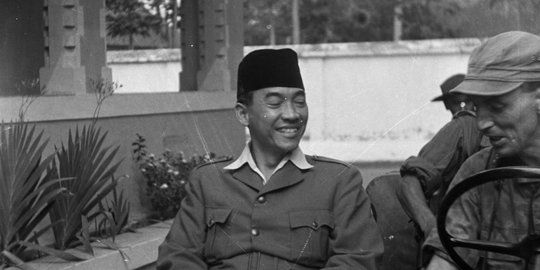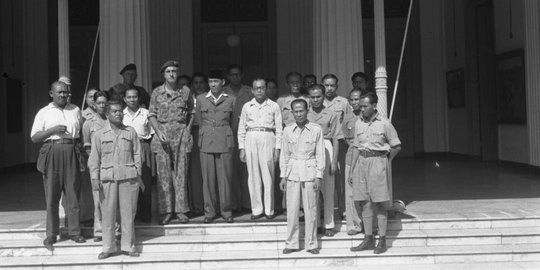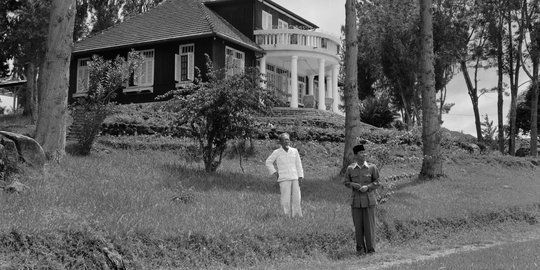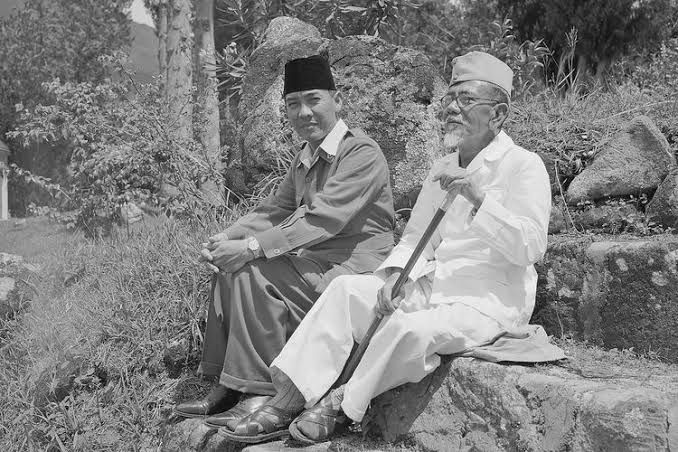
An atmosphere of restlessness overcame Sukarno that morning. The President of the Republic of Indonesia (RI) was seen back and forth in one of the rooms of the Yogyakarta State Palace. For a moment he turned to Colonel T.B. Simatupang, one of the TNI officials who was there, asked for advice: what should he do?
"You'd better let them catch us. I know for sure, they won't kill the captives," said Simatupang, as was told by historian Anhar Gonggong.
A few hours later an army of Special Forces Corps (KST) soldiers led by Lieutenant J.B. Schussler entered the State Palace. Still fresh in Schussler's memory, he saw Sukarno's face so gloomy. Despite trying to be calm, the platoon commander of the KNIL Special Forces Corps (KST) caught the nervousness in the body language of the republican leader.
"The first thing Sukarno asked with a worried tone was whether the dreaded Captain Westerling was our commander?" recalls Schussler as quoted by Lambert Giebels in his book Soekarno: Biography 1901-1950.

The Green Beret platoon commander replied that Westerling was no longer the KST commander. He then informed that from that moment on, Sukarno and his staff were officially in Dutch military captivity. Schussler then handed over all the prisoners in the palace to Captain A.V. Vosveld, subordinate to Colonel D.R.A. van Langen, commander of the Tigjer Brigade assigned as the head of the operation to occupy Yogyakarta.
"Vosveld entered the palace with an automatic pistol in hand… reminding in a loud voice the people gathered in the vestibule of the palace, that they (from then on) were prisoners," said Giebels.
Lieutenant J.A. Bakker, a subordinate of Vosveld, was then given the task of taking care of Sukarno. In Bakker's memory, Sukarno was wearing a shirt and suspender without a skullcap and did not look like the one he often saw in photographs.
"(Sukarno) doesn't look like the handsome man in the photo at all. He looks more like a Chinese man who is starting to bald and looks sad," Bakker said in a long letter to his family.
Despite trying to give the impression of calm, Sukarno was actually afraid. In his autobiography Bung Karno Penjambung Lidah Rakjat Indonesia, compiled by Cindy Adams, Sukarno admitted that at that time he was feeling depressed.
"I have a feeling that they will kill me..." Sukarno said.
Sukarno's fear grew even greater, when with Sutan Sjahrir and Haji Agus Salim, he was flown in a Dakota plane whose destination was not clear. Instead of him, the pilot who flew them from Maguwo did not understand the purpose of their trip.
"He still hadn't revealed where we were going," said Sukarno.
The three of them only understood when the plane landed in North Sumatra. From Medan they were then taken to Brastagi, a city with cool air. There the political prisoners were placed in a large house, which was surrounded by two layers of barbed wire and under the tight guard of hundreds of Dutch soldiers.

Bung Karno got more and more fear when his feet stepped on the exile house. The image of death threats kept haunting him. The situation worsened when Saniah, a young woman who used to cook food for the three prisoners, suddenly met Sukarno.
"I asked what I was going to cook for you tomorrow and the officer in charge said: no need. Sukarno will be shot tomorrow morning," the woman said in a trembling voice.
The tension caused cold sweat to drip from Sukarno's body. That night he couldn't even squint at all. Suddenly out of nowhere, came the desire to take the Koran which he always carried with him wherever he went. Holding the holy book to his chest, Sukarno's heart prayed.
Sukarno then opened the Koran. He did not care at all what surah or verse of the Koran he would read. Only one belief rose in him at that moment: hoping to get a clue from the first sentence on the left page.
"With trembling hands, I opened the small green book by chance. I read the top sentence on the left page which reads: Do not believe what comes out of human mouths. Only God Almighty knows the fate of to His people."
The next day there was no death penalty for Sukarno. But since that incident, Sukarno became wary and did not want to touch the canned food served by the Dutch army chef. He only wanted to eat if it was cooked by Saniah and delivered by Karno Sobiran (Saniah's husband).
"What we ate, that's what Bung Karno ate," recalls Karno Sobiran as quoted by Muhammad TWH in the book Leaders of the Republic of Dutch Captivity in Brastagi and Prapat.
Fortunately that condition did not last long. After obtaining permission from the commander of the exile, Sukarno was allowed to get food directly from the husband and wife, not from the chefs of the Dutch army. He calmed down then.

** Your post has been upvoted (16.73 %) **
Curation Trail is Open!
Join Trail Here
Delegate more BP for bigger Upvote + Daily BLURT 😉
Delegate BP Here
Upvote
https://blurtblock.herokuapp.com/blurt/upvote
Thank you 🙂 @tomoyan